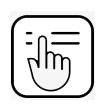
Symptoms of Bipolar Disorder usually appear in late adolescents or early twenties, later for women. Recognizing the symptoms and receiving help early is an important part of effectively managing it.
Reckless behavior
Suicidal Thoughts
Appetite Loss
Guilt and despair
Delusions
Extremely overjoyed and energetic
Lack of energy
Depressed, hopeless, or irritable
Attention deficiency and loss of memory
Issues Sleeping
Faster Speech

Bipolar I Disorder
Bipolar I Disorder experiences the most severe manic episodes, a period of euphoria or anger and can include psychotic features, and a depression episode. Other criteria:

Bipolar II Disorder
Bipolar II Disorder is similar to Bipolar I but with a hypomania phase instead of a mania phase. Hypomania is a less intense manic phase, although still has debilitating symptoms.

Cyclothymia
A rare mood disorder causing emotional ups and downs, less extreme than bipolar I or II disorder but more extreme and more frequent than normal human emotions.

Rapid Cycling Bipolar
Rapid Cycling Bipolar is a subset of Bipolar 1 or 2 in which 4 or more manic phases occur within a year.

Bipolar Disorder with Mixed Features
With Bipolar Disorder with Mixed Features you may experience the high emotions of mania simultaneously with the low symptoms of depression.

Other Types of Bipolar Disorder
Diagnosed when a person shows some symptoms of bipolar disorder but doesn't meet all the criteria outlined in the Diagnostic and Statistical Manual of Mental Disorders.
Meet the dedicated care providers specializing in tailored bipolar treatment and holistic care. Begin your journey to a renewed life with us.


855-722-4422

Accept no one’s definition of your life; define yourself.

– Harvey Fierstein
Access the right support system and benefit from an inclusive space designed to help you manage bipolar symptoms and lead a better life.

Find A Therapist

Check Your Insurance

Book Your Online/Offline Therapy Session

Understanding your need for effective symptom management, we connect you with a specialized bipolar disorder therapist who will address your requirements and create a tailored treatment plan to alleviate your challenging circumstances.
Embark on virtual therapy for bipolar disorder from the comfort of your home. Our services offer holistic support for overcoming symptoms associated with bipolar disorder.
Speak with a Bipolar Disorder Therapist
Our Therapists | Insurance | Services Offered | Privacy
Bipolar disorder significantly influences a person's energy, mood, and functional capacity. Clients with bipolar disorder undergo severe mood episodes lasting from a few days to weeks, characterized by depressive or manic/hypomanic states. With proper treatment, individuals with bipolar disorder can lead fulfilling and productive lives. Our counselors at the bipolar disorder treatment center are here to help!
Recognize the signs:
If you experience these symptoms, seek help by searching for phrases like 'bipolar therapy near me' or 'bipolar specialist near me.' Alternatively, contact us 24/7 to schedule your appointment.
Bipolar disorder presents in diverse ways, encompassing episodes of depression and mania/hypomania. It can be categorized as follows:
Early detection and appropriate intervention are vital as symptoms can fluctuate over time and vary among individuals.
Bipolar disorder has four forms:
Each type presents unique challenges, and tailored treatment is essential for effective management.
Seek help at 'bipolar disorder treatment near me' and take control of your life!
Lifebulb therapists and counselors specialize in providing in-person or online therapy for various mental health needs, including anxiety, depression, trauma, PTSD, couples counseling, life transitions, bipolar disorder, schizophrenia, eating disorders, child counseling, teen and adolescent therapy, anger management, career coaching, life coaching, ADHD treatment, and more.
Your initial session with a Lifebulb bipolar disorder therapist goes beyond background information. We focus on providing the service you seek, demonstrating that therapy can be effective with mutual effort and commitment.
Accessing a bipolar disorder specialist should be quick and easy. Search for 'bipolar disorder treatment near me' and visit our website to browse therapists' bios. Schedule a virtual or in-person counseling session online or call our office for assistance. Whether online or offline therapy, your therapist will create an individualized treatment plan to help you reach your goals.
In case of an emergency, call 911 immediately. While Lifebulb is not a crisis center, our bipolar disorder therapists will provide direct email and phone access for urgent situations. Your therapist may offer resources based on your treatment plan for issues beyond the scope of online or offline therapy.
When scheduling a session with your therapist or counselor, our team will send you a confirmation of your appointment date and time via email, along with a link to the virtual bipolar disorder therapy room. Prior to your session, log in a few minutes early to the virtual therapy room using the provided link, where your bipolar disorder specialists will be ready to meet with you.
Certainly. All our therapists are capable of delivering top-notch online bipolar disorder therapy and comprehensive bipolar disorder treatment services to our clients.
We utilize a HIPAA-compliant video counseling service integrated into our Electronic Health Records System to ensure a seamless process for online therapy sessions. To book a session, contact our office, or request a specific time on our website. A team member will assist you in scheduling with the most suitable therapist and confirming your session details, whether in-person or virtual.
Booking is convenient and flexible. Reach out to our office, and a team member can assist in scheduling with the most suitable therapist. Alternatively, choose your preferred therapist on our website, select a session time, and we'll confirm the appointment details with you.
Our cancellation policy is flexible. Contact our office or your counselor at least 24 hours before your scheduled online therapy session to cancel or reschedule without any cost.
While there's no guaranteed "cure," bipolar disorder treatment is a long-term process proven to enhance overall mental health. Therapy contributes to positive lifestyle changes and is linked to healthy adjustments in the brain and body.
We accept various major commercial insurance plans, including Aetna, Amerihealth, Cigna, Optum Health, United Healthcare, Tricare, and others. If your insurance is not listed, we can verify your benefits or offer an affordable self-pay rate.
Lifebulb operates without ongoing membership or fees. We believe in providing the best online therapy services without additional out-of-pocket expenses.
We strive to keep costs low by accepting most major insurance plans. For those without insurance or opting not to use benefits, we offer a competitive self-pay rate.
At Lifebulb, if your therapy experience falls short of expectations, we'll assist in connecting you with a preferred therapist.
We take privacy seriously, adhering to HIPAA guidelines. For privacy and security inquiries, contact us at privacy@lifebulb.com.
Lifebulb prioritizes the well-being of bipolar disorder therapists, ensuring a positive workplace environment. This commitment translates to therapists providing the best bipolar therapy experience for clients.
All online therapy sessions are conducted in private spaces by our therapist aid bipolar disorder, utilizing a video platform within our HIPAA-compliant Electronic Health Records system to maintain privacy.
Yes, Lifebulb is considered a covered entity under HIPAA guidelines, following all rules and regulations. Contact us at privacy@lifebulb.com for any privacy or security concerns.
Lifebulb prioritizes creating an optimal environment for therapists, believing this enhances the quality of bipolar disorder therapy for clients. We aim to provide the best setting for therapists, leading to successful client outcomes.
Lifebulb rigorously selects therapists, ensuring they align with core values and have advanced education. Our therapists are committed to going the extra mile for clients, offering the best therapy for bipolar disorder online or in-person.
Lifebulb has multiple clinic locations for counseling and offers telehealth or online therapy sessions for those at a distance. We are located across Delaware, Florida, Georgia, Massachusetts, New Jersey, Pennslyvania, South Carolina, Texas, and Virginia.
Our counselors undergo thorough educational programs, training sessions, background screenings, and in-house workshops to ensure the delivery of top-notch in-person and online therapy services.
It is important that our clients work with the best possible fit as a bipolar disorder therapist for their specific treatments for bipolar disorder. This is why we provide detailed bios of our therapists for our clients to review before reaching out to us. If you have a specific bipolar disorder therapist in mind to work with, we would be happy to schedule you to see them. We also understand that our clients don't always match perfectly with their therapist, and in the case of a less-than-great fit, we will help you to find the right match among our team and, if necessary, provide the best referral we can to someone more suited to help you beyond our walls.
A licensed professional counselor is a mental health professional holding a master's or PhD-level degree, authorized by a state board to diagnose and address mental health conditions. Typical licensures encompass Licensed Mental Health Counselor (LMHC), Licensed Professional Counselor (LPC), Licensed Clinical Professional Counselor (LCPC), and Licensed Professional Clinical Counselor (LPCC).
We enlist licensed clinical psychologists because they offer specialized services, including top-tier online therapy and psychological evaluations, which many other licensed professionals cannot provide. Often, your counselor or therapist collaborates with a psychologist to ensure comprehensive support tailored to your specific needs or objectives, including bipolar medication, therapy, and psychological testing when deemed necessary. This collaborative approach enables us to address a broader spectrum of your requirements effectively.
Look through our expansive list of carefully curated resources to learn about adjustment disorders.